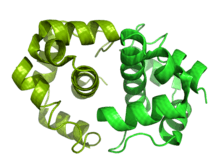Anti-sigma factors

In the regulation of gene expression in prokaryotes, anti-sigma factors bind to sigma factors and inhibit transcriptional activity. Anti-sigma factors have been found in a number of bacteria, including Escherichia coli and Salmonella, and in the T4 bacteriophage. Anti-sigma factors are antagonists to the sigma factors, which regulate numerous cell processes including flagellar production, stress response, transport and cellular growth. For example, anti-sigma factor 70 Rsd in E. coli is present in the stationary phase and blocks the activity of sigma factor 70 which in essence initiate gene transcription. This allows the sigma S factor to associate with RNA polymerase and direct the expression of the stationary genes. Although binding of Rsd to σ70 has been shown and numerous structural studies on Rsd have been performed, the detailed mechanism of action is still unknown.[1]
References
- ↑ Nina, Hofmann; Wurm, R; Wagner, R (2011). "The E. coli Anti-Sigma Factor Rsd: Studies on the Specificity and Regulation of Its Expression". PLoS ONE. doi:10.1371/journal.pone.0019235.